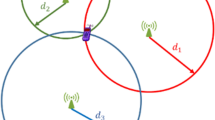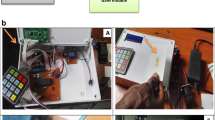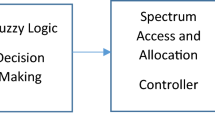Abstract
Even though radio frequency identification (RFID) systems are spreading more and more as a medium for identification, location and tracking purposes, some reliability issues of these systems still need to be solved. In fact, RFID readers and tags experience collisions when sharing the wireless transmission channel over the same area. In this work, we propose a centralized scheduling-based algorithm as possible candidate solution for the reader collision problem in passive RFID systems. This algorithm has been designed taking into account the circuitry limitations of the tags, which do not allow the usage of frequency or code division multiple access schemes in passive RFID systems. The solution herewith proposed, which is suitable for those scenarios involving static or low mobility readers, aims at preventing reader collisions and provides at the same time low channel access delay to the readers. The performance of this algorithm has been tested via computer simulations. The results show that the proposed solution strongly reduces collision occurrences and, especially in static scenarios, provides low access delay to the readers during the channel contention phase.
Similar content being viewed by others
References
WP2—requirements and specifications. ASPIRE public deliverable, Sep. 2008. http://www.fp7-aspire.eu/fileadmin/aspire/docs/D2_2.pdf.
Finkenzeller K. (2003) RFID-handbook. Wiley, London
Kim D.-Y., Yoon H.-G., Jang B.-J., Yook J.-G. (2009) Effects of reader-to-reader interference on the UHF RFID interrogation range. IEEE Transcations on Industrial Electronics 56(7): 2337–2346
Ahson S., Ilyas M. (2008) RFID handbook: Application, technology, security and privacy. CRC Press, Boca Raton, FL
Engels, D. W. & Sarma, S. E. (2002). The reader collision problem. In IEEE international conference on systems, man and cybernetics (pp. 1–6).
Zhou, S., Luo, Z., Wong, E., Tan, C. J., & Luo, J. (2007). Interconnected RFID reader collision model and its application in reader anti-collision. In 2007 IEEE international conference on RFID gaylord texan resort, Grapevine, TX, March 26–28.
Birari S. M., & Iyer, S. (2005) Mitigating the reader collision problem in RFID networks with mobile readers. In 13th IEEE international conference on networks, 2005 (pp. 463–468).
Waldrop, J., Engels, D. W. & Sarma, E. (2003). Colorwave: An anticollision algorithm for the reader collision problem. In IEEE conference on communications (ICC ’03), Ottawa, Canada, 2003 (pp. 1206–1210).
Quan, C. H., Choi, J. C., Choi, G. Y., & Chae-Woo, L. (2008). The slotted-LBT: A RFID reader medium access scheme in dense reader environments. In 2008 IEEE international conference on RFID, The Venetian, Las Vegas, Nevada, April 16–17.
Galiotto, C., Marchetti, N., Prasad, N., & Prasad, R. (2010). Low access delay anti-collision algorithm for readers in RFID systems. In Proceedings of the 13th international symposium on wireless personal multimedia communications (WPMC), October 11–14.
Kwon D.-K., Kim W.-J., Klm H.-N. (2007) Improvement of anti-collision performance for the ISO 18000-6 type B RFID system. IEICE Transactions on Communications 90(8): 2120–2125
EPC radio-frequency identity protocols. (2008). Class-1 Generation-2 UHF RFID. Protocol for Communications at 860 MHz–960 MHz. Version 1.2.0. EPC Global. http://www.gs1.org/gsmp/kc/epcglobal/uhfc1g2/uhfc1g2_1_2_0-standard-20080511.pdf.
Ho, J., Engels, D., & Sarma, S. (2006). HiQ: A hierarchical Q-learning algorithm to solve the reader collision problem. In 2006 international symposium on applications and the internet workshops (SAINT 2006 Workshops).
Author information
Authors and Affiliations
Corresponding author
Rights and permissions
About this article
Cite this article
Galiotto, C., Marchetti, N., Prasad, N. et al. Low Access Delay Anti-Collision Algorithm for Readers in Passive RFID Systems. Wireless Pers Commun 64, 169–183 (2012). https://doi.org/10.1007/s11277-012-0524-7
Published:
Issue Date:
DOI: https://doi.org/10.1007/s11277-012-0524-7




